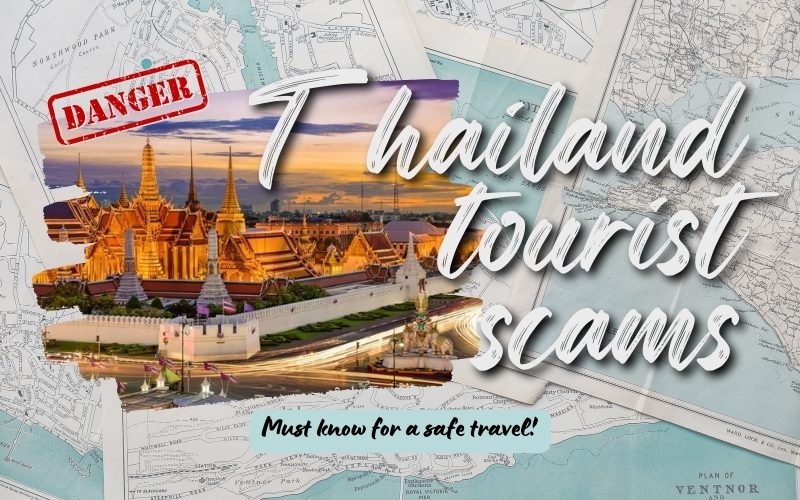
Thailand is known as a tourist paradise in Southeast Asia. Each year, the land of the Golden Temples attracts millions of international tourists from all around the world. You can easily enjoy high-quality accommodation services and affordable travel costs, but on the other hand, be aware of money-losing scams targeting tourists in Thailand! To ensure a safe and satisfying Thailand travel, let’s take a look at some of the common scam methods below.
Thailand Tourist Scams & How to Identify Them
Motorbike Rental Scam
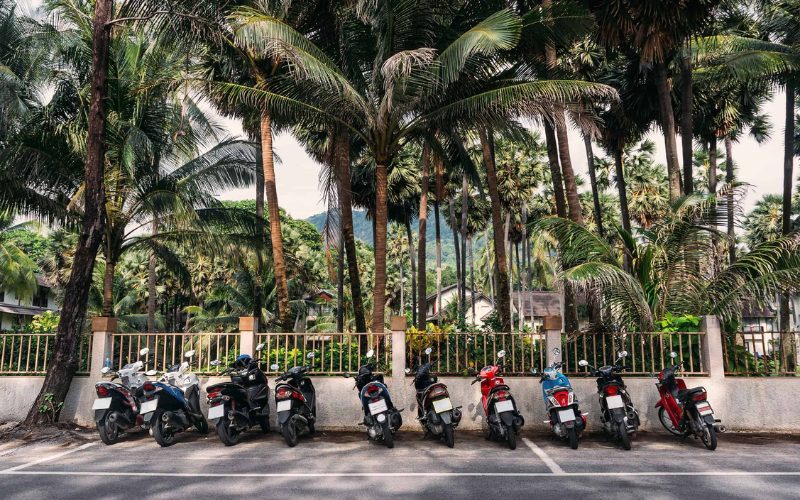
Motorbikes for rent in Thailand
Motorbike rentals are quite popular in Thailand, but not all services are trustworthy. Falling victim to a fraudulent rental service can cost you a lot of money. These can use cunning scam tactics that are hard to detect.
One common trick involves the rental owner falsely accusing you of damaging or scratching the motorbike. They then demand a hefty sum for repair costs, even though the vehicle was not damaged by you. Some scammers even go as far as stealing the motorbike themselves and blaming the tourists for the theft. Keep in mind that the same trick also happens with underwater vehicles. On Thai beaches, you can find many services offering vehicle rental for jet skiing, kayaking, and parasailing.
Tips to Avoid:
- Thoroughly research reputable rental agencies beforehand.
- Most importantly, never give your passport to anyone when renting a vehicle.
- Take photos of the vehicle before and after rental to document its condition.
- Use your own lock to secure the motorbike whenever possible.
Taxi Scam
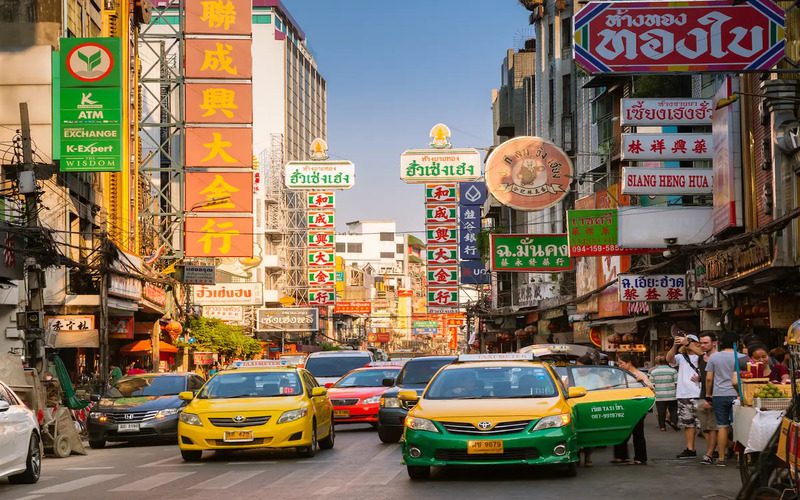
Taxi in Thailand
Not only motorbike rentals, but taxi scams are also rather common in Thailand. When taking a taxi, many drivers deliberately avoid using the meter or claim that it’s broken. After that, tourists have to pay a lot of money even though the distance is relatively short.
Another trick is meter tampering, where taxi meters run faster than usual, leading to exorbitant fares.
Tips to Avoid:
- Always ensure the taxi has a working meter before starting your journey.
- Agree on the fare upfront with the driver.
- For added safety and transparency, consider booking through travel apps like Grab – these apps display the fare directly on the screen, protecting you from the tricks of traditional taxi drivers. You can also hire a private car with us in advance to ensure the most comfortable experience.
Tuk-Tuk Scam
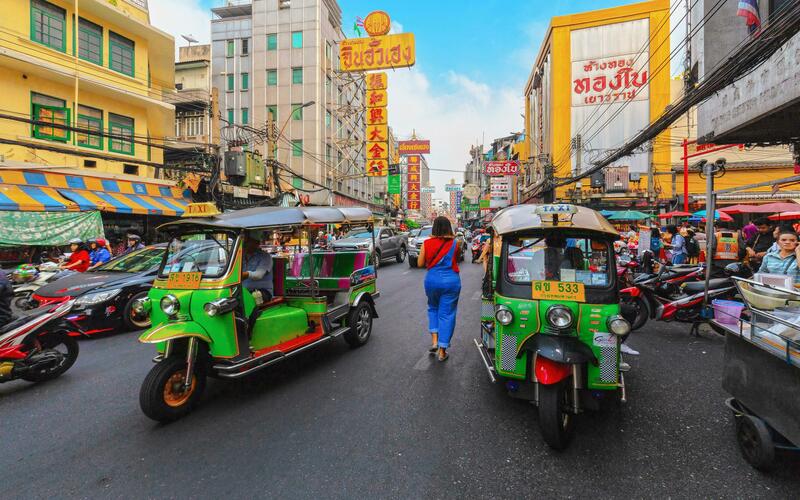
Thailand’s tuk-tuk
Tuk-tuks are a common mode of transportation in Thailand, especially in major cities. While they are a convenient way to get around, not all tuk-tuk drivers will give you a straightforward ride. Some may take you on a longer, circuitous route through various streets, markets, and unfamiliar areas, resulting in a much higher fare than expected.
Another common scam involves drivers offering very low fares only to take passengers to various shops where they receive commissions, and tourists are forced to listen to a 20-minute sales pitch, or even be pressured into buying expensive souvenirs.
Tips to Avoid:
- Agree on a fare before starting the journey.
- Avoid drivers who suggest unscheduled stops.
- Always bring a map or use Google Maps to track your route.
- Traveling in groups can enhance your safety when using tuk-tuks.
Fake Money Scam
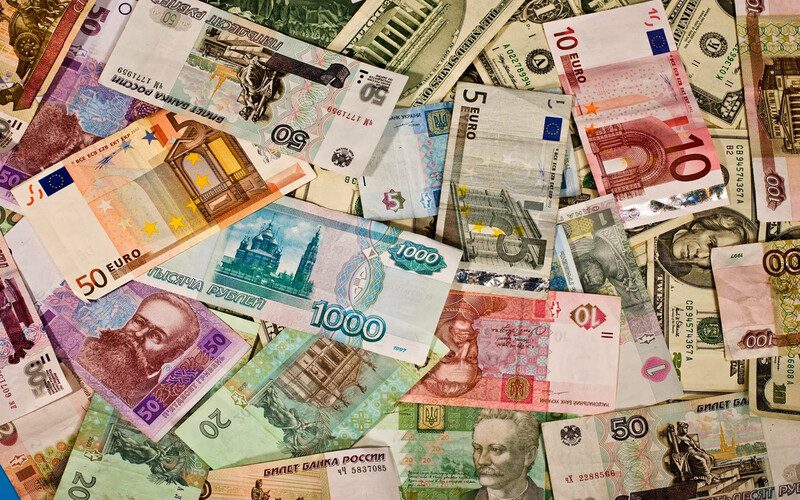
Thai money
Fraudsters often target foreign tourists who can’t easily distinguish between fake and real money, taking advantage of their lack of familiarity to steal from them. This is one of the most prevalent and dangerous scams in Thailand. Scammers mix counterfeit bills with genuine ones during transactions, making it difficult to spot the fakes.
Another scam that targets people unfamiliar with Thai currency happens at exchange counters. Scammers may intentionally give you less money than you’re entitled to. If you lack experience with Thai money, you might not notice the shortfall.
Tips to Avoid:
- Research how to identify real and fake money online, or ask locals for advice.
- The safest option is to exchange foreign currency at service counters licensed by state agencies.
- Avoid exchanging money at small, unreliable street establishments, as the risk of receiving counterfeit bills is significantly higher.
- Remember to carefully check and count the amount of money you receive at the exchange counter multiple times.
Attraction Closed Scam

The Grand Palace
If you’re suddenly approached by someone speaking surprisingly fluent English near a tourist attraction in Thailand, be cautious, as this could be a common scam aimed at parting from your money.
Here’s how it works: scammers will start by spreading false rumors that popular tourist attractions like The Grand Palace or temples are currently closed. They’ll then offer alternative tours at seemingly cheaper prices. If you agree, you may end up spending unfairly on transportation and being pressured into buying overpriced souvenirs or eating at costly restaurants with poor food quality.
Tips to Avoid:
- If someone approaches you with an unsolicited offer, don’t engage with them – just say you already have the plan for today and politely decline their offer.
- Always use official websites, or social media, or consult with your hotel to confirm the status of popular tourist attractions.
- Never feel pressured to book a tour or make a decision on the spot. Take your time, and don’t be afraid to walk away if you’re not comfortable with the offer.
Bar Scam
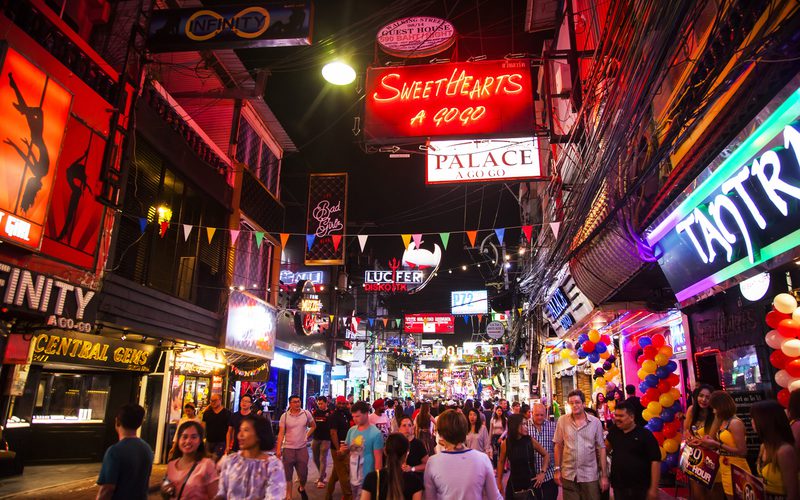
Pubs and bars in Pattaya walking district
One of the prevalent scams in Thailand occurs in lively entertainment districts like Patpong’s red light district. Scammers, often posing as friendly locals or bartenders, approach you in the street or in a bar, offering you a “special deal” on drinks and shows.
However, if you’re inside, you’ll be bombarded with overpriced drinks and fake promises of free shows. The drinks will be ridiculously expensive, and the “free” shows will either not exist or be of poor quality When the bill arrives, you’ll be shocked by the exorbitant prices, which can range from hundreds to thousands of baht.
Tips to Avoid:
- Politely deny such offers and walk away. Refrain from engaging in any services or performances offered by these bars.
- Scammers often prey on drunk tourists. Keep your wits about you, and don’t let your guard down.
- Many hotels and resorts have staff who are familiar with the local area, so you can ask them for advice on which bars and clubs to avoid.
Scam at Hua Lamphong Train Station
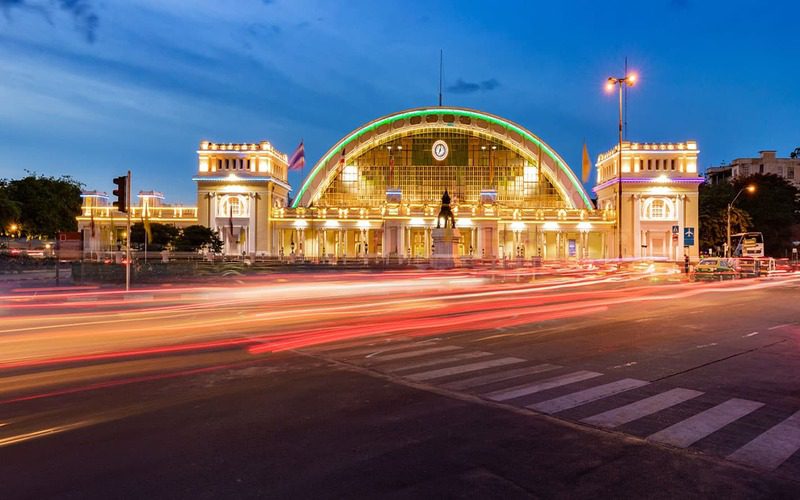
Hua Lamphong Train Station
This is a common scam encountered by many foreign tourists at Hua Lamphong, the main train station in Bangkok.
The perpetrators typically approach tourists, posing as helpful individuals, and offer to assist with purchasing train tickets. They may express concern and enthusiasm, informing you that your desired train is fully booked. Subsequently, they’ll propose an alternative: taking a taxi, which they claim is cheaper than the train fare. However, upon arrival, the taxi driver demands a fare significantly higher than initially agreed upon. If you refuse, they may become aggressive and pushy, putting you in a difficult situation. This scam often involves collusion between the ticket touts and taxi drivers.
Tips to Avoid:
- If someone suggests taking a taxi instead of the train, politely decline. You’re perfectly capable of making your own decisions about transportation.
- If someone claims your train is fully booked, check the train schedule or ask a legitimate ticket vendor for confirmation. You can also use online resources or check the train station’s website to confirm availability.
Police Impersonation Scam
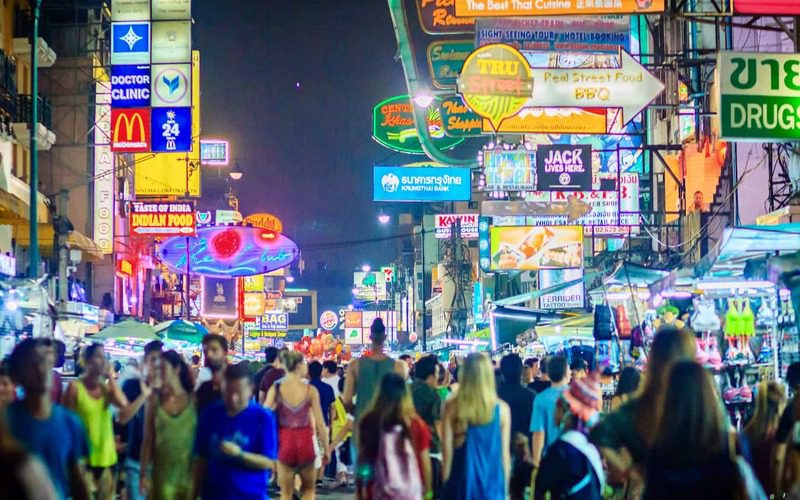
A crowd of tourists in Bangkok
While many foreigners visit Thailand for vacation, some are suspected of working illegally, making it necessary for Thai police to occasionally check tourists’ passports. Unfortunately, some people exploit this for personal gain. Their scam tactics are wearing police uniforms and conducting unauthorized passport checks – once they have your passport, they may accuse you of violating some obscure law or regulation, such as not having the correct visa or overstaying your welcome. They then demand fines which must be paid on the spot. The scammer may also threaten to arrest you or deport you if you don’t comply with their demands.
Tips to Avoid:
- Remain calm and do not comply with their demands.
- Refuse to give your passport to anyone who claims to be a police officer unless you’re certain they are legitimate.
- Politely request to go to the nearest police station to resolve the issue officially. Typically, impostors will back down once they realize you can still keep your composure under their pressure tactics.
Above is some helpful information about common Thailand tourist scams, which the Thai government is still trying to control and eliminate. It’s essential for international tourists to equip themselves with the knowledge to avoid falling prey to traps like these.
Despite these occasional challenges, Thailand remains a remarkable destination that every traveler should explore and experience. For further guidance, feel free to reach out to us. Our dedicated travel experts are here to assist you with any questions or concerns you may have!
Read more:





This post is a lifesaver! I was almost tricked by the Grand Palace “closed” scam. A random guy tried to redirect us to a fake temple. Why do locals participate in this? Is it still common in 2025 or has it improved?
Thanks so much for your comment, we’re really glad the post helped you out! Unfortunately, the “Grand Palace is closed” scam is still something visitors occasionally encounter, even in 2025. While many locals are genuinely helpful, a small number may be involved in these scams for quick commissions from tuk-tuk drivers or shops. The good news is that awareness is improving, and authorities have been cracking down on these practices more in recent years. Just remember: if a major site like the Grand Palace is actually closed, you’ll usually see clear signage at the entrance, not just someone telling you on the street. Safe travels, and feel free to reach out if you need any help planning the rest of your trip!
Best regards,
IDC Travel Team